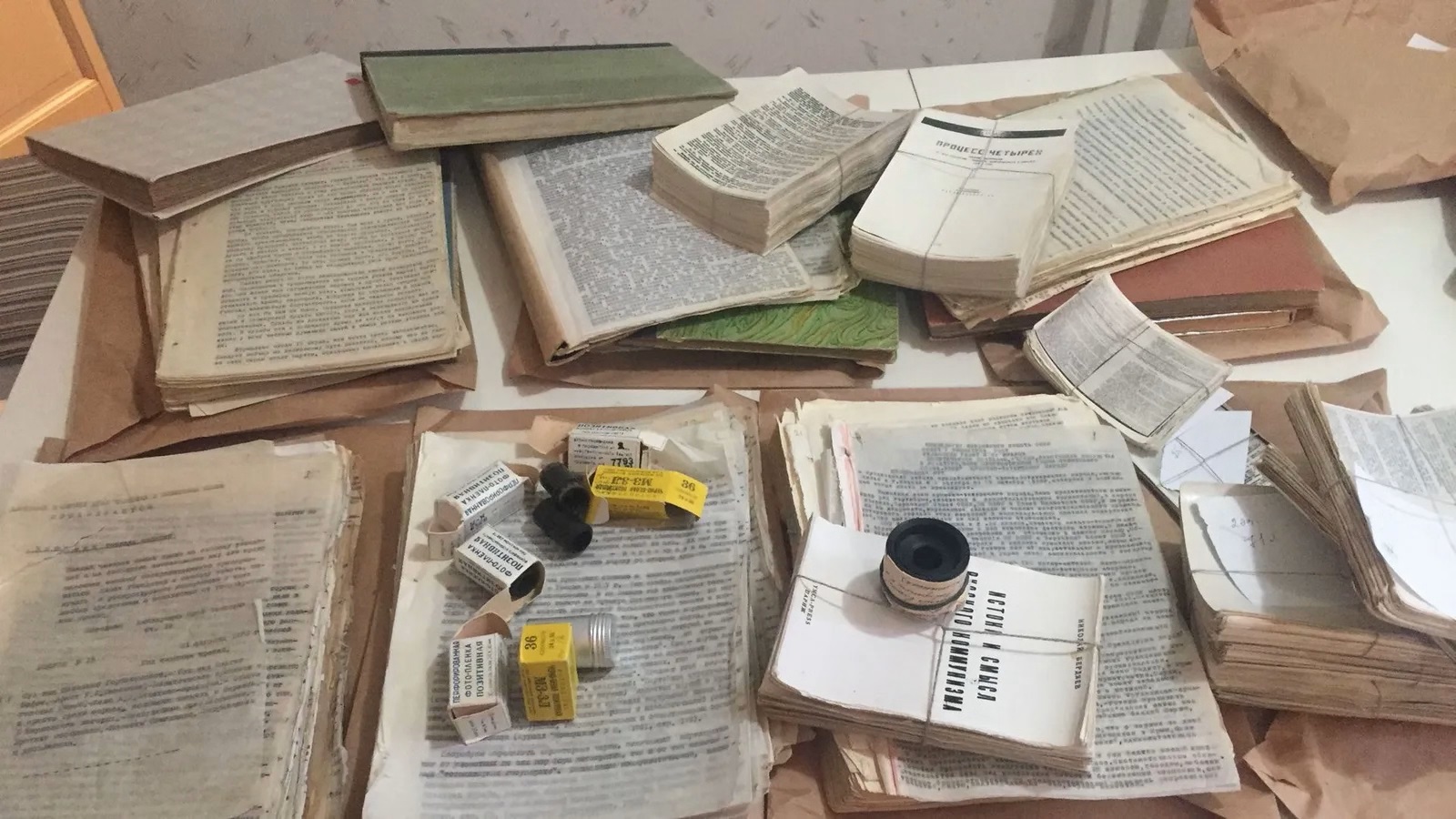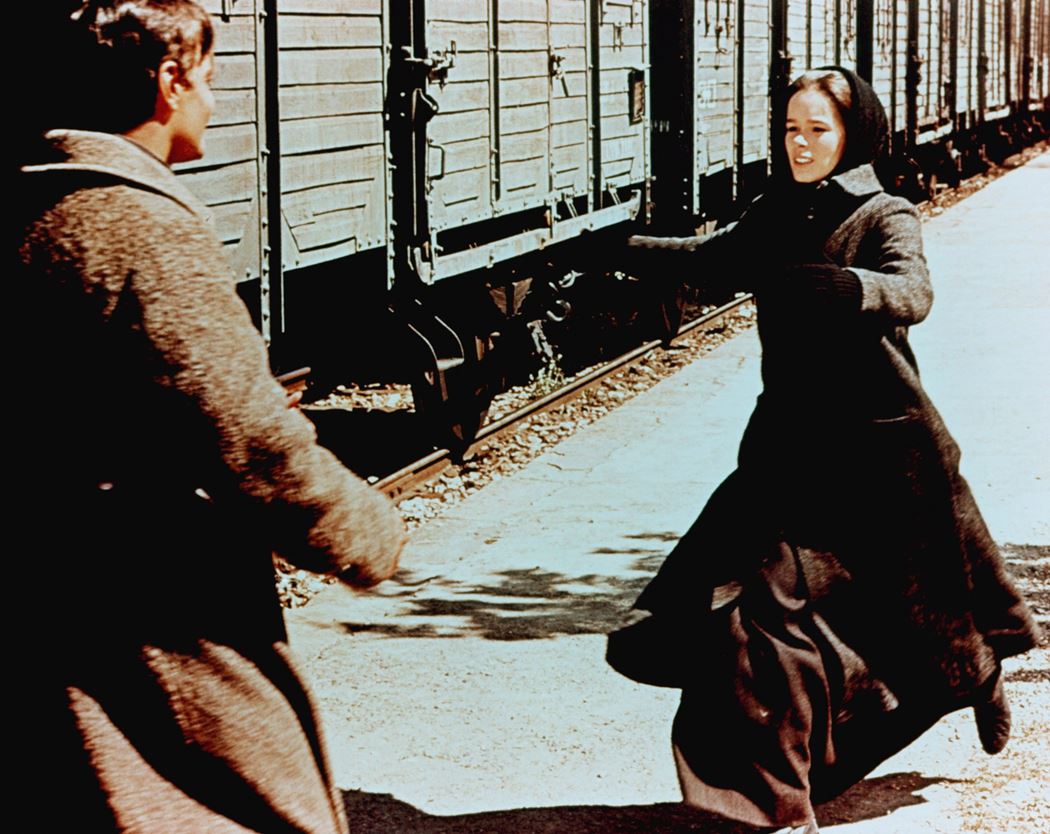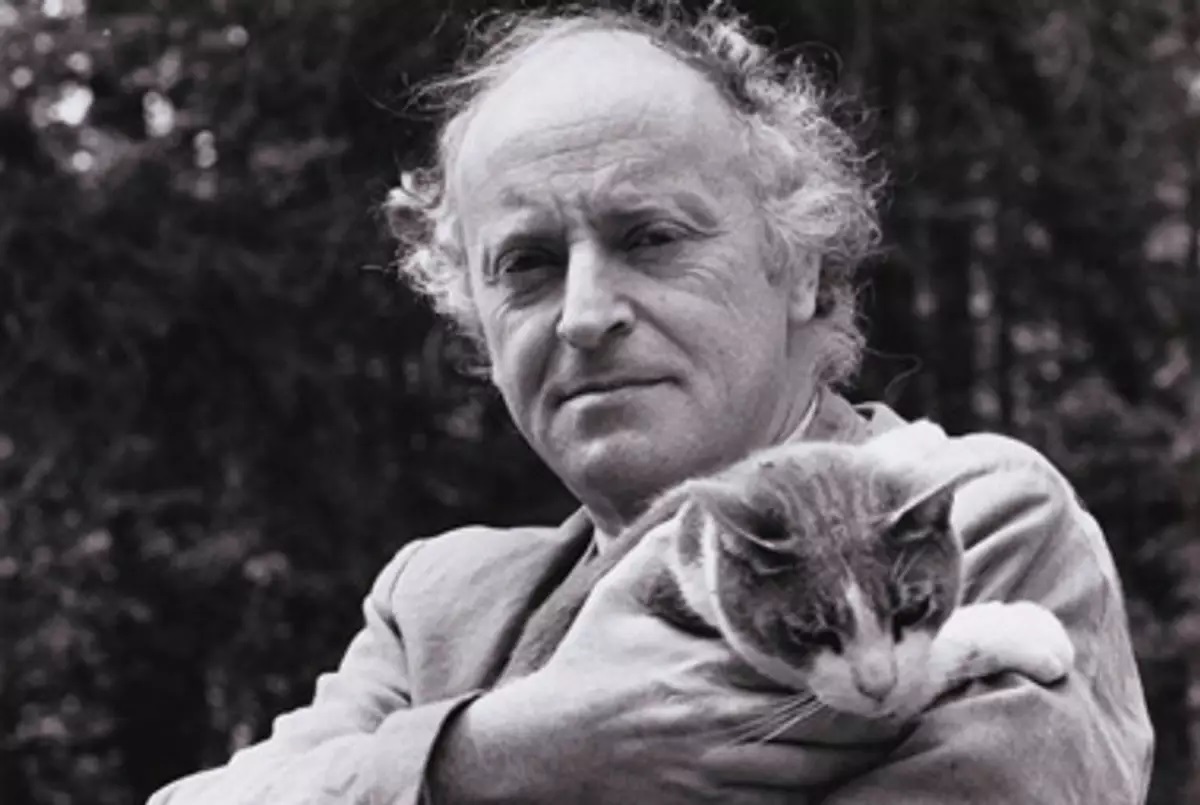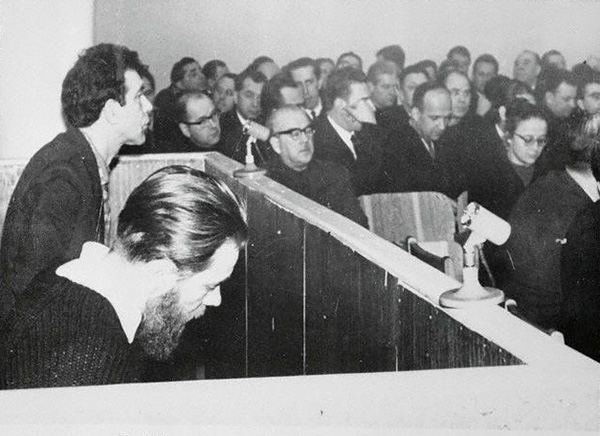Smuggling “The West”: Tamizdat and Translations in the USSR
Miriam Rossi is a PhD student in the School of Humanities at Tallinn University. In her article, Rossi explores the development of the tamizdat and samizdat in the Soviet Union, focusing on these literary realms’ links to “the West”. She suggests that despite the intensely normative and oppressive environment that writers existed within, they continued to find ways and spaces to avoid Soviet censorship and to smuggle their works to readers outside the USSR and to engage with foreign literary texts. Rossi highlights four main figures, Boris Pasternak, Yuly Markovich Daniel, and Andrey Donatovich Sinyavsky, who were active within the tamizdat circle, and Joseph Brodsky, whose activity as a poetry translator was considered unaligned.
The USSR has always had an ambiguous relationship with what lied outside the Soviet Union. The country’s ambiguity towards the outside world was eventually revealed to be a strategy used to criticize nationalisms, and at the same time to keep Soviet citizens completely isolated.
Despite the fact that Soviet discourse was characterized by internationalism from the revolution until its collapse, reaching its peak in 1935[1], it presented a clash between the rejection and acceptance of foreign world(s). Despite the Soviet Union’s professed internationalism, it was in reality a very isolated state.
A number of attempts were made to overcome this isolation. Amongst such efforts was the practice of publishing and circulating Soviet works abroad. These works passed through the clandestine tamizdat[2]system, in which they were circulated and then smuggled back into the USSR.

In addition, texts were translated in both official and unofficial contexts. These two phenomena illustrate the fascination and need for contact with the “imaginary West”[3]. The purpose of this article is to briefly elaborate on the “smuggling” of texts and the repercussions of these clandestine exchanges.
The smuggling of texts was especially represented by the tamizdat, or the circulation of works that were “denied approval by the official censor but were published abroad (either with or without their author’s consent)”[4]. Texts within the tamizdat were smuggled into circulation outside the Soviet Union and were clandestinely brought back into the USSR.
Although there were some cases where the authorial consent was not entirely respected[5], this phenomenon nevertheless allowed many authors to publish and popularize pieces that could not be published in the Soviet Union. This practice was put into place from the early stages of the USSR — for instance, Sergey Zamjatin (1884–1937) could only publish his dystopic novel, My (We), abroad in 1924[6].
Texts were not only smuggled out of the USSR into foreign literary circles, but also from the outside world back into the USSR, through the realms of the tamizdat, samizdat[7], and official channels. In fact, the literary texts written beyond the Iron Curtain, though they were published officially, offered a precious occasion to escape the Soviet reality.

The institutionalization of the concept of socialist realism during the First Congress of the Writers’ Union in 1936 led both the content and form of literary works to be placed under censorial scrutiny. Socialist realism focused on the imposition of a certain form and way of writing and left little to no space for a writer’s individuality. In this grim landscape, many authors decided to find refuge in translation. Through this practice, they could deal with texts they were passionate about and hide behind foreign authors’ words.
Boris Pasternak (1890–1960), among the most well-known and highly appreciated poetry translators, translated Georgian poems and Shakespeare’s plays. His translations were memorable and destined to become part of his original poetic contribution.
However, not all translations were accepted by the Soviet Union. The poetess Ol’ga Sedakova declares:
[R]eally it was not just my poetry and prose that was not being published. Nor were the best translations (either these were translations of “unsuitable” authors including, for example, Claudel, or they took a form which deviated from the accepted norm)[8].
These accepted norms “concerned the evaluation of cultural and artistic forms as correct and incorrect from a political standpoint”[9].
While the officialdom could boast about the skill of the translators that belonged to the Union of Soviet Writers, who had undertaken many translation projects, these figures were required to translate within the rules of official Soviet discourse. In addition, journal editors had to cope with the restrictions that were dictated by the Gosizdat (State Publishing House). The editors developed strategies to cope with the situation, such as including a preface that positioned the writer within Soviet ideology and publishing foreign authors that were considered more or less undesirable by Soviet rhetoric[10].
Therefore, both original texts and translations could be rejected. For a number of writers, poets, and translators, it was difficult to make a living and to express themselves without compromising the original intent of their work. In an effort to highlight situations in which writers were accused of anti-Soviet crimes because of their smuggling of texts and the “improper” nature of their work (i.e., short stories, poetry, translations) and lifestyles, four prominent literary figures will be discussed below.
To begin with, the poet Boris Pasternak was a member of the Writers’ Union and was a well-liked poet in the USSR. Though he welcomed the revolution enthusiastically, his poems were not always accepted, and he therefore mostly worked as a translator. Due to the apparent wave of change in the Soviet Union under Khrushchev, Pasternak tried to officially publish his novel Doktor Zhivago, but it was rejected by the authorities.

Consequently, the novel, where Pasternak elaborated on theological themes and crucial events in Soviet history, circulated within the tamizdat and eventually led him to win the Nobel Prize in Literature in 1958. The Soviet authorities reacted negatively to Pasternak’s nomination and ability to publish his works abroad.
As a result, he declined the Nobel Prize for fear of having to expatriate if he were to accept it. Despite Pasternak’s decision to refuse the award,[11] the state press started a harsh campaign against the writer, who was subsequently isolated and expelled from the Writers’ Union. He died two years later in his dacha in Peredelkino (near Moscow) and was reinstated only in 1987[12].
Joseph Brodsky (1940–1996) was a poet, writer, and translator from Leningrad (St Petersburg). During his years in Leningrad, he wrote poems and translated texts from Polish and Serbian into Russian. He was arrested for parasitism in 1964. During his trial, the witnesses against him were various and numerous. These included several figures of the Writers’ Union, teachers, and commoners.
However, he was also courageously defended by the renowned translators Samuil Marshak and Korney Chukovsky. These figures were defined by Brodsky’s lawyer as “outstanding specialists and masters of translation”[13], as both had been working within the official publishing system. Furthermore, Brodsky was supported by Efim Etkind, a prominent member of the Translators’ Section of the Writers’ Union.
Nevertheless, because he was not permanently affiliated with the Writers’ Union, the court decided that Brodsky was not a poet or a translator, but rather a parasite. He was condemned and sentenced to five years of forced labour. The trial was “illegally” recorded by Frida Vigdorova, a journalist, novelist, and writer, and then circulated within the samizdat and tamizdat. Brodsky’s case symbolized a porog (threshold) for Leningrad’s cultural life, and the poetess Anna Akhmatova defined it as “a Universal Judgement”[14].

Yuly Markovich Daniel (1925–1988) was a poet, a short-story writer, and a translator. He taught Russian literature and worked as a translator, dealing especially with the languages of other countries of the USSR. He managed to publish the anti-Stalinist This Is Moscow Speaking, and Other Stories in Paris in 1962 under the pseudonym Nikolay Arzhak.
Andrey Donatovich Sinyavsky (1925–1997) was a critic and a writer of short stories. He wrote in the literary journal Novy Mir and contributed to the publication of a prominent volume of poems by Pasternak with a courageous and objective introduction.

He smuggled several writings to the West with the pseudonym Abram Tertz: the critical essay On Social Realism (1960), his novels The Trial Begins (1960) and The Makepeace Experiment (1965), and his piece Fantastic Stories (1963). Both Daniel and Sinyavsky were arrested in 1965 and were respectively condemned to five and seven years of detention and hard labour in 1966, because of their anti-Soviet smuggling.
The whole process was a parody: almost none of the witnesses at the trial had read the anti-Soviet writings that the authors had been accused of writing and no official transcript of the trial sessions was provided, leaving scholars to conclude that the sentences were likely decided in advance.
Daniel and Sinyavsky defended themselves, declaring that they had no anti-Soviet or anti-patriotic purpose in publishing those stories. Instead, they hoped to depict the details of the Soviet reality. Sinyavsky declared: “I am not a socialist realist. I am not a Marxist. I am an idealist, but I am not an enemy of the USSR”[15].
The coverage of this trial in the foreign media and the intervention of a number of Soviet authors who tried to defend the two writers were unexpected, because Daniel and Sinyavsky were not especially popular authors. Soviet authorities did not expect this kind of outcome and were surprised by the fact that many authors were not afraid to defend their colleagues.
The active response of the intelligentsia was linked to both the disappointment felt towards the Khrushchev Thaw and to the previous attacks against Pasternak. Ernst J. Simmons, who analysed Daniel’s and Sinyavsky’s cases in the US media in 1966, interpreted the intelligentsia’s involvement as a sign of renewed strength and courage after a long period of Soviet terror:
[T]he conscience of Soviet intellectuals…has survived the furnace of doubt and now refuses to be silent. The hero of Daniel-Arzhak’s Redemption declares in anguish: “I can never forgive myself that I did not go to see Pasternak when he was in trouble.”[16]
This trial marked the start of a new wave of repression against the intelligentsia under Leonid Brezhnev, whose leadership was characterized by a general trend of “re-Stalinisation”, “anti-intellectual” policies,[17] and renewed censorial strictness.
These trials had different consequences: firstly, they showed the abstract nature of the changes that were promised under the Khrushchev Thaw; secondly they resonated with the foreign press, making foreign countries more aware of the situation in the Soviet Union; thirdly, they caused Brodsky and Sinyavsky to emigrate after they were released from prison, as many individuals had done before and after them; fourthly, it paradoxically gave strength to opposition movements, such as the Human Right Movement and the underground world — especially the samizdat, where uncensored texts could circulate.
In fact, the samizdat developed exponentially during the period of stagnation, despite the strictness of the authorities. Brodsky, the figure of poetry translation, became an inspiration for the last generation of the Leningrad samizdat authors: from the end of the 1970s, poetry translations became more and more frequent in the Leningrad samizdat journals. The translators within the samizdat re-acquired the autonomy of choosing which texts to translate and how to translate them: translation was no longer an escape, but rather the introduction of foreign authors into the Soviet Russian context that had not previously been able to find space in the officialdom.
The abundant presence of literary translations in the late samizdat shows that even towards the end of the Soviet experience, the “Imaginary West” was a crucial character in the clandestine readings. This was also arguably due to a lack of representation of foreign literature in the officialdom. From Latin poets to contemporary US poets, the late samizdat offered a great variety of foreign literature usually anticipating the publications of the officialdom: the most striking example is Charles Bukovsky’s poems, which were published in the samizdat journal “Predlog” in 1984.
The first official Russian translations of the American poet saw the light only in the year 2000. Another case is Aldous Huxley’s novel, Brave New World, which was published in “Predlog” in 1986, three years before its first official translation (1989).[18]
The smuggling of texts had, therefore, been a crucial aspect of anti-Soviet dissent. The violence of the Stalinist repressions, the criminal trials of the early years of the period of stagnation, and the following censorial repressions could never completely annihilate cultural exchanges with the foreign world or writers’ self-expression. As Brodksy stated during his trial, being a poet is a gift that “comes from God”[19] — Yuri Zhivago would certainly agree.
This work was supported by the Estonian Research Council's grant PRG1206 (“Translation in History, Estonia 1850-2010: Texts, Agents, Institutions and Practices”).
Miriam Rossi is a PhD student at Tallinn University. Her research interests include translation history and poetry translation, with a focus on the Soviet Union and the role of literary translation in the underground system of samizdat. In her research, she engages with the social theories of Pierre Bourdieu and with the academic contributions in the field of Translation Studies (Susanna Witt, Brian J. Baer and Anthony Pym), in the anthropology of the late Soviet period (Alexei Yurchak and Sergei Oushakine), and scholarly discussions on samizdat (Marco Sabbatini, Josephine Von Zitzewitz and Ann Komaromi).
Sources:
[1] Clark, Moscow the Fourth Rome, 169.
[2] “tamizdat, n.,” https://www-oed-com.i.ezproxy.nypl.org/view/Entry/197405?redirectedFrom=tamizdat. tamizdat, n Russian, < tam there + izdat, abbreviation of izdat'el'stvo publishing house, after SAMIZDAT n. Russian writings which were published abroad and smuggled back into the U.S.S.R.; (also) this system of publication.
[3] Yurchak, Everything Was Forever Until, 158-206.
[4] Pospielovsky, “From Gosizdat to Samizdat,” 44.
[5] Klots, “Varlam Shalamov Between Tamizdat,” 137-166. See Varlam Shalamov’s case.
[6] Pospielovsky, 46. His case can be defined as “proto-tamizdat”.
[7] “samizdat, n.” https://www-oed-com.i.ezproxy.nypl.org/view/Entry/170390?redirectedFrom=samizdat. samizdat, n. Russian, abbreviation of samoizdátel′stvo self-publishing house, < samo-self + izdátel′stvo publishing house. The clandestine or illegal copying and distribution of literature (originally and chiefly in the U.S.S.R.); an ‘underground press’; a text or texts produced by this. Also transferred and attributive or as adj. in samizdat, in this form of publication.
[8] Polukhina, “Conform Not to This”, 58.
[9] Yurchak, 163.
[10] Sherry, Discourses of Regulation, 1-208.
[11] Shapiro, “From the archive,” https://www.theguardian.com/theguardian/2013/oct/30/boris-pasternak-refuses-nobel-prize-1958. These were the words of the telegram Pasternak sent to the Swedish Academy to decline the award: “Considering the meaning this award has been given in the society to which I belong, I must reject this undeserved prize which has been presented to me. Please do not receive my voluntary rejection with displeasure. - Pasternak.”
[12] Taubman, “Soviet Writers Reinstate Pasternak.”https://www.nytimes.com/1987/02/24/world/soviet-writers-reinstate-pasternak.html.
[13] Vigdorova, “The Trial of Joseph,” 204.
[14] Pavan, Gli anni Sessanta, 24.
[15] Simmons, “The Trial Begins”, 719.
[16] Simmons, 721.
[17] Zalambani, Censura, istituzioni e politica letteraria, 27.
[18] “O divnyj novyj mir”, https://fantlab.ru/work31535. The first Russian translation of Huxley’s Brave New World was published in 1977 in “Vremia i my” (The time and us), a literary and political journal run by Russian emigrants.
[19] Vigdorova, 185. 2. Valentina Polukhina, “Conform Not to This Age: an Interview with Ol’ga Sedakova,” in Reconstructing the Canon: Russian Writing in the 1980s, ed. Arnold McMillin (London: University of London, 2000).
Bibliography
Britannica, T. Editors of Encyclopaedia. “Andrey Donatovich Sinyavsky.” Encyclopedia Britannica, February 21, 2021. https://www.britannica.com/biography/Andrey-Donatovich-Sinyavsky.
Britannica, T. Editors of Encyclopaedia. “Yuly Markovich Daniel.” Encyclopedia Britannica, January 1, 2021. https://www.britannica.com/biography/Yuly-Markovich-Daniel.
Clark, Katerina. Moscow the Fourth Rome: Stalinism, Cosmopolitanism, and the Evolution of the Soviet Culture 1931-1941. Cambridge: Harvard University Press, 2011.
Klots, Yasha. “Varlam Shalamov Between Tamizdat and the Soviet Writers’ Union (1966-1978),” Russian Literature 96, no. 98 (2018): 137-166. https://doi.org/10.1016/j.ruslit.2018.05.006.
“Nezabytaja premija” [Unforgotten Prize]. Lenta.Ru. Jan. 12, 2009. https://lenta.ru/articles/2009/01/12/nobel/.
“O divnyj novyj mir” [Brave New World]. FantLab.ru. 2021. https://fantlab.ru/work31535.
Pavan, Stefania. Gli anni Sessanta a Leningrado. Luci e ombre di una Belle Époque [The 60s in Leningrad. Lights and shadows of a Belle Époque]. Firenze: Firenze University Press, 2009.
Pospielovsky, Dmitri. “From Gosizdat to Samizdat and Tamizdat,” Canadian Slavonic Papers 20, no. 1 (1978): 44-62.
“samizdat, n.”. OED Online. March 2021. Oxford University Press. https://www-oed-com.i.ezproxy.nypl.org/view/Entry/170390?redirectedFrom=samizdat.
Shapiro, Henry. “From the archive, 30 October 1958: Pasternak gives up the Nobel Prize as attack on him grows.” Guardian. Oct. 30, 2013. https://www.theguardian.com/theguardian/2013/oct/30/boris-pasternak-refuses-nobel-prize-1958.
Sherry, Samantha. Discourses of Regulation and Resistance: Censoring Translation in the Stalin and Khrushchev Era Soviet Union. Edinburgh: Edinburgh University Press, 2015.
Simmons, Ernest J. “The Trial Begins for Soviet Literature,” The Massachusetts Review 7, no. 4 (1966): 714-724.
“tamizdat, n.”. OED Online. March 2021. Oxford University Press. https://www-oed-com.i.ezproxy.nypl.org/view/Entry/197405?redirectedFrom=tamizdat.
Taubman, Philip. “Soviet Writers Reinstate Pasternak.” New York Times. Feb. 24, 1987. https://www.nytimes.com/1987/02/24/world/soviet-writers-reinstate-pasternak.html.
Vigdorova, Frida. “The Trial of Joseph Brodsky,” New England Review 34, no. 3-4 (2014): pp. 183-207. https://www.nereview.com/files/2014/01/NER-Vigdorova.pdf.
Yurchak, Alexei. Everything Was Forever Until It Was No More. Princeton: Princeton University Press, 2006.
Zalambani, Maria. Censura, istituzioni e politica letteraria in URSS (1964-1985) [Censorship, institutions, and literary politics in the USSR]. Firenze: Firenze University Press, 2009.